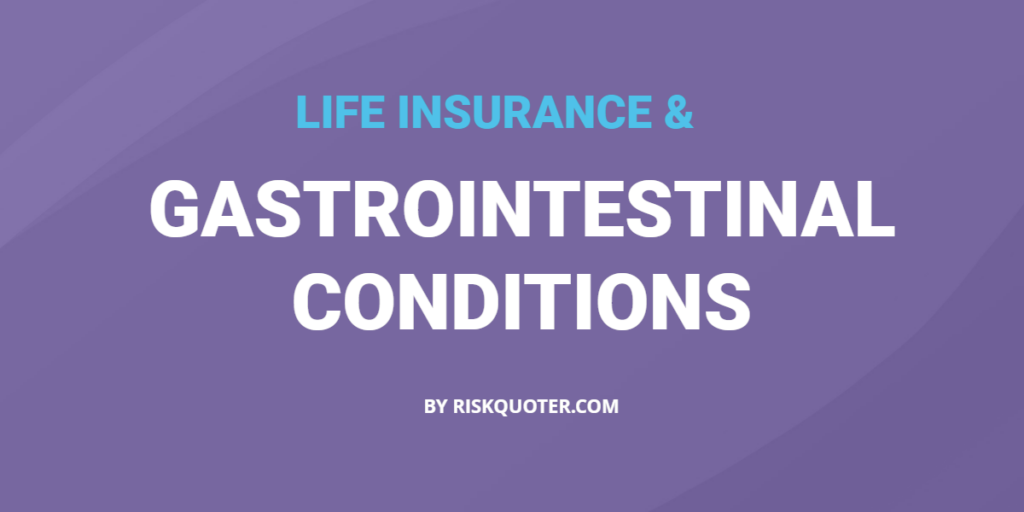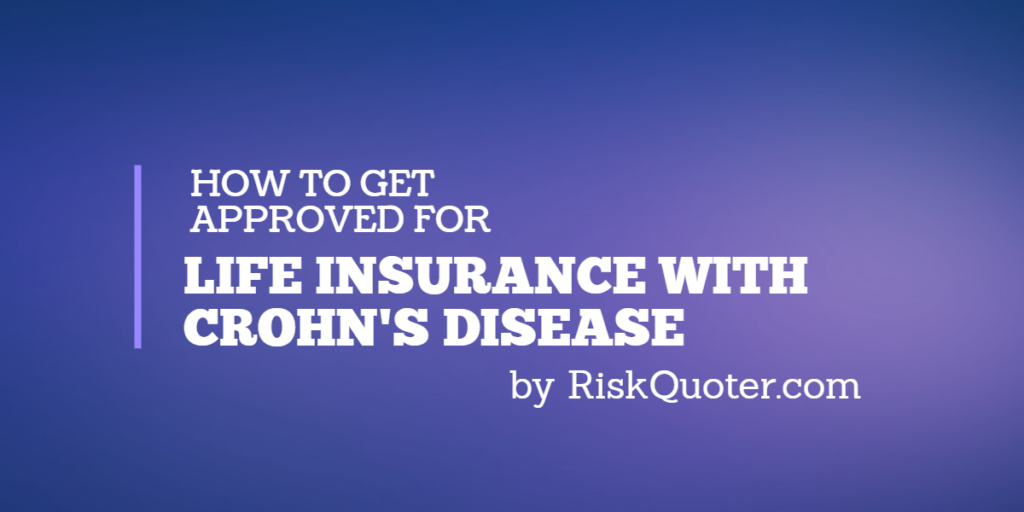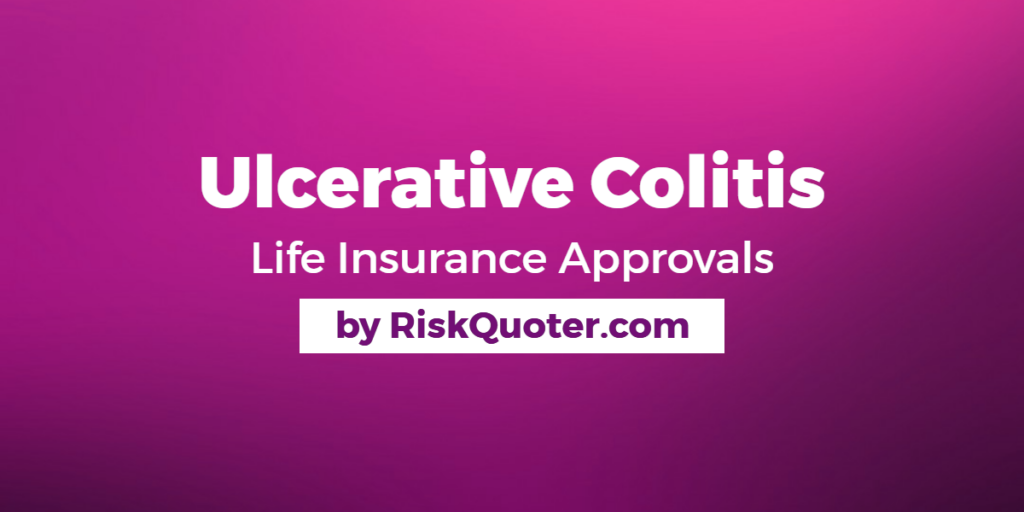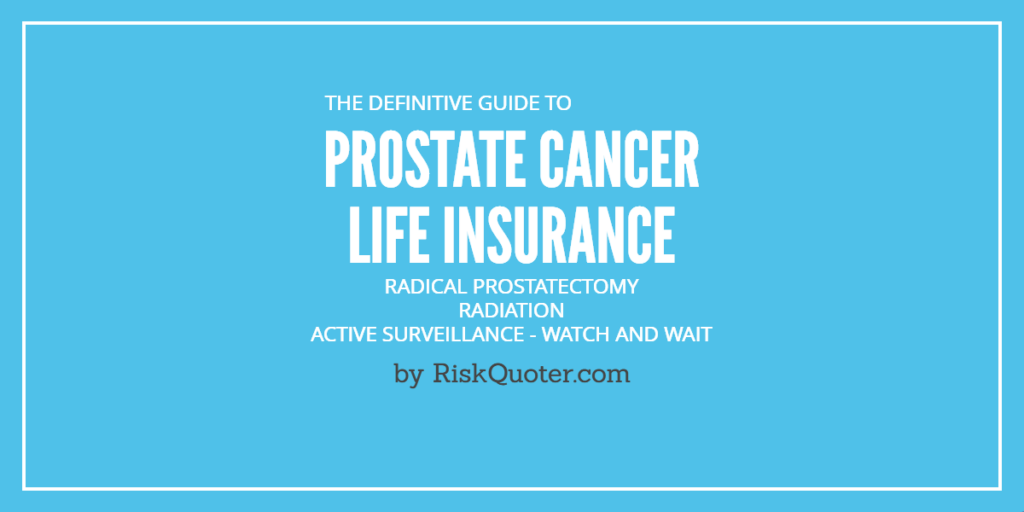Living with a gastrointestinal condition like Crohn’s disease, ulcerative colitis, IBS, or other conditions can be challenging enough without the added worry of buying life insurance.
Many people with these high-risk health conditions wonder if they can get coverage and, if so, what rates they can expect.
This guide will walk you through the process, explaining how underwriting works and the factors influencing your rates. It will also show you how RiskQuoter helps you find the best coverage for your needs.
How Gastrointestinal Conditions Affect Life Insurance Underwriting
Life insurance underwriters assess several key factors when evaluating applicants with gastrointestinal conditions:
Life insurance underwriting looks at:
- Diagnosis – What is your exact medical condition?
- Severity & Control – How severe is your condition, and how well controlled is your medical condition?
- Compliance – Do you take your medications as directed? Do you visit your physician regularly? Are you current with all screening tests?
The best thing you can do for yourself when trying to obtain life insurance is to follow doctor’s orders, take your meds, and ensure you are up to date with all colonoscopies and screening tests.
Inflammatory Bowel Disease (IBD) & Life Insurance
Inflammatory Bowel Diseases (IBD) like Crohn’s disease and ulcerative colitis are the most complicated to underwrite.
Crohn’s Disease
According to the Crohn’s and Colitis Foundation of America, about one in every 200 Americans has been diagnosed with Crohn’s disease.
Crohn’s disease (granulomatous enteritis) is an inflammatory bowel disease characterized by chronic inflammation of the terminal ileum, ileum, and colon.
Symptoms may include:
- Abdominal pain
- Blood in bowel movements
- Diarrhea
- Fatigue
- Fissures or fistulas
- Elevated liver enzymes
- Iron deficiency (anemia)
- Kidney stones
- Weight loss
- Ulcers or lesions
With Crohn’s disease, underwriters consider the disease’s severity, location (upper or lower gastrointestinal tract), complications like fistulas or strictures, surgical history (e.g., bowel resection), and time since the last flare-up/episode.
While there is no known cure for Crohn’s, successful treatment allows life insurers to offer coverage.
While each life insurer uses its own guidelines, most classify Crohn’s as mild, moderate, or severe, while others may categorize based on medication only, one-time surgery, or recurrent surgery.
Crohn’s Underwriting Tip
Timing is everything with Crohn’s disease. The more time passes since your diagnosis and/or last episode, the better the rates generally become.
For many clients, we can get you the best rate available now and reapply in the future as more time passes.
Crohn’s Underwriting by Company
Below is the most accurate information on Crohn’s disease underwriting. It is based on a combination of company underwriting guidelines, industry reference and educational information, and actual experience working with clients with Crohn’s.
When we help you with your life insurance, we’ll summarize your health history and contact all of the competitive companies for Crohn’s.
Most companies do not provide agents with detailed underwriting information about Crohn’s. Instead, we use years of experience to provide information.
Here is general information from some of our companies.
| Company | Crohn’s Underwriting |
|---|---|
| Corebridge Financial1 | The postponement period is six months from the diagnosis date or severe episode. Rates range from Table 2 to Table 4. If the last episode was ten years, standard rates are available Two episodes in past year – Table 6 range Underwriting credits for no steroid use. Daily steroid may add one table to the above. |
| John Hancock2 | The postponement period is 6 months from the diagnosis date or severe episode. Rates range from Table 2 to Table 4. If the last episode was ten years, standard rates are available Two episodes in past year – Table 6 range Underwriting credits for no steroid use. Daily steroid may add one table to the above. |
| Pacific Life3 | Postpone periods of 6 months from the surgery date or 12 months after a severe flare-up or episode. Standard rates may be available for some. |
| Prudential4 | Postpone period of 12 months from the date of diagnosis. Does better with insureds aged 45 and above Mild – Preferred is possible two years after stability Moderate – Standard – Table 4 range Severe – Table 2 – Table 4 range Vitality Progam is available to help further reduce rates |
Most clients with Crohn’s tend to receive a table-rated offer from life insurers.
Crohn’s Disease Life Insurance Case Studies
Mild Crohn’s Disease
Male, age 40
Diagnosed in early 20’s with mild Crohn’s.
The last flare-up was 5 years ago
Colonoscopy within 24 months – normal
Takes Entyvio
Underwriting outcomes:
- Banner – Standard+ Table 2
- Corebridge – Table 2
- Prudential – Table 3
- North American – Table 2
- Minnesota Life – Table 2
- Mutual of Omaha – Table 6
- Symetra – Table 3
- Nationwide – Table 4
- John Hancock – Table 2
- Protective – Table 2
Coverage placed with Banner Life.
Moderate Crohn’s Disease
Male, age 65
Diagnosed at age 20, bowel resection history.
The last flare-up was 3 years ago
Colonoscopy 12 months – no active flare
Takes Pentasa, blood pressure meds.
Underwriting outcomes:
- Corebridge – Standard
- Banner Life – Table 6
- Prudential – Table 1
- North American – Standard
- Lincoln National – Table 2
- Protective – Table 2
- Nationwide – Table 2
- Mutual of Omaha – No offer
- John Hancock – Table 4
- Brighthouse – Table 2
Coverage placed with Corebridge.
Submit your request for quotes. There’s no obligation or pressure. We’ll discuss your life insurance needs and show you the best options available.
Ulcerative Colitis
Ulcerative colitis is an inflammatory bowel disease (IBD) affecting approximately 1 million Americans.
With life insurance, it’s all about the severity of your UC.
That, coupled with the treatment and the time since your last flare-up, determines your life insurance rate.
Ulcerative Colitis – Key factors include the extent of colon involvement (proctitis, left-sided, or pancolitis), the severity of UC, complications like toxic megacolon, or the presence of dysplasia in biopsies.
The underwriting concern for ulcerative colitis and Crohn’s disease is the increased risk of developing colon cancer.
How Ulcerative Colitis Affects Life Insurance Underwriting
Severity is the key factor for people with inflammatory bowel diseases such as ulcerative colitis.
Mild Ulcerative Colitis
Most mild cases are similar to the following.
- Adult-onset for most cases.
- Mild inflammation is limited to the left side of the colon.
- Infrequent flare-ups.
- Intermittent rectal bleeding, intermittent diarrhea, and abdominal cramps.
- Medications are limited to sulfasalazine, mesalamine, Asacol, Rowasa enemas, Cort enemas, and over-the-counter drugs like Imodium.
- Medical marijuana use.
- Limited use of oral steroids during flare-ups.
- There is no anemia history.
- No skin, arthritis, or eye problems.
- No history of hepatitis.
- Good medical records and consistent follow-up.
Proctitis and proctosigmoiditis will follow the same life insurance underwriting as mild UC.
Moderate Ulcerative Colitis
Moderate ulcerative colitis may include:
- Mostly adult-onset.
- Left-sided or pancolitis (entire colon).
- More frequent flare-ups
- S
horter duration of time between flare-ups. - More severe symptoms of bleeding, diarrhea, and abdominal pain.
- Medications include Entyvio or injections with Humira.
- Prednisone is used more frequently.
- They may have had hospitalizations.
- Anemia
- Good medical records and follow-ups with physicians.
Severe Ulcerative Colitis
If you have a history of severe UC, having great follow-ups, current lab tests, and recent colonoscopies are critical to getting coverage.
Severe ulcerative colitis medical histories include the following:
- Childhood-onset is common
- Frequent episodes
- Fever
- Heavy bleeding
- Hospitalization & surgical treatment.
- Persistent symptoms after surgery.
- Unfavorable colonoscopy results indicate dysplasia.
- Weight loss greater than 10% of average body weight.
- Continuous use of steroid-based medications.
- Severe inflammation of the colon.
- Significant Anemia
Other factors affecting underwriting include liver function test results if significantly elevated.
Guaranteed issue life insurance is the only option available for any of the following:
- Fulminant ulcerative colitis
- Sclerosing cholangitis
- Pericholangitis.
Have you been rated or declined for life insurance?
Ulcerative Colitis Underwriting by Company
| Company | Ulcerative Colitis Underwriting |
|---|---|
| Corebridge Financial1 | The postponement period may be as little as 3 months from the diagnosis date for mild UC. Mild – Standard rates or better after 24 months Moderate – Table 2 – 4 rates, better after 24 months. Severe – Table 3 – 6 rates, and possibly a Table 4 after 48 months. |
| John Hancock2 | The postponement period is six months from the diagnosis date or severe episode. Rates range from Table 2 to Table 4. If the last episode was 10+ years ago, standard rates apply. Two episodes in the past year – Table 6 range, or three flareups in the past 24 months. Underwriting credits for no steroid use. Daily steroid use may add one table to the above. Standard rates are available 6 months after colectomy, with no complications. |
| Prudential4 | The postponement period is six months from the diagnosis date or severe episode. Rates range from Table 2 to Table 4. If the last episode was 10+ years ago, standard rates apply. Two episodes in the past year – Table 6 range, or three flareups in the past 24 months. Underwriting credits for no steroid use. Daily steroid use may add one table to the above. Standard rates are available six months after colectomy, with no complications. |
| Banner Life8 | Ulcerative colitis limited to protosigmoid or left side, with no treatment other than meds may qualify for Standard Plus rates. More extensive pancolitis with good follow-up and recent colonoscopy may qualify for Standard Plus Table 3. |
Ulcerative Colitis Case Studies
Mild Ulcerative Colitis
Male, age 51
Diagnosed 15 years ago with mild UC.
The last flare-up was 2 years ago
Colonoscopy within 12 months – normal
Underwriting outcomes:
- Corebridge – Table 2
- Prudential – Table 3
- Minnesota Life – Table 4
- Mutual of Omaha – Table 2
- Symetra – Standard
- John Hancock – Table 3
- Protective – Table 2
Coverage was placed with Symetra.
Moderate Ulcerative Colitis
Female, age 46
Diagnosed at age 27 – Moderate pancolitis
The last flare-up was within 12 months.
Colonoscopy showed moderate UC but no dysplasia.
Takes Entyvio
Underwriting outcomes:
- Corebridge – Table 2
- Prudential – Table 3
- Lincoln National – Table 5
- Protective – Table 4-6
- Mutual of Omaha – Table 2
- John Hancock – no offer
- Transamerica – Table 4
Coverage was placed with Corebridge Financial as their rates were the most competitive.
Underwriting Questions for UC
We need to know:
- Ulcerative colitis diagnosis date
- How many flare-ups of ulcerative colitis have you had in the past six months, twelve months, 24 months, and the past five years?
- Have you been hospitalized for ulcerative colitis?
- Do you take any medications for ulcerative colitis?
- If yes, what do you take, and what dosage?
- If you took steroids, please indicate the dates of use.
- Have you had surgery, or has surgery been recommended?
- Have you had any significant weight loss?
- Colonoscopy dates and results.
- If you’re part of a clinical trial, underwriting will look for any history of side effects, including any impact on your immune response or blood tests.
The best life insurance company for you depends on your medical history.
Don’t let a prior negative experience discourage you from trying again. Many of our clients were declined with other agents because they applied to the wrong company.
We use a quick quote process that takes 3-4 days to hear back from all companies specializing in UC.
If you participate in scuba diving or aviation, let us know, as some companies will be better than others.
With that being said, some of the best life insurance companies for ulcerative colitis have been:
- Corebridge Financial
- Banner Life
- John Hancock
- Prudential
Including the above, we shop at 15+ companies for every ulcerative colitis case.
Just Diagnosed? Most companies will postpone life insurance for 3-6 months after diagnosis.
Companies want to see follow-up physician visits and treatment indications starting to work.
Life insurance underwriting will require a paramedical exam and a review of your medical records.
Other Gastrointestinal Conditions and Life Insurance
Most other conditions present little problem with underwriting as long as your condition is controlled and has not progressed to something more significant.
Irritable Bowel Syndrome (IBS)
IBS is a minor underwriting concern unless symptoms are severe or there has been no medical consultation or follow-up.
Most underwriting rate classes are available for IBS. Make sure you’ve had regular checkups and a colonoscopy if your doctor has requested one.
Gastroesophageal Reflux Disease (GERD)
GERD is an esophagus disorder, with symptoms being regurgitation of the stomach acids.
For 90% of people with GERD, life insurance underwriting is not a problem.
It’s the 10%9 of people with GERD who develop Barrett’s Esophagus.
Barrett’s Esophagus
Acids that reach the esophagus can damage the lining and may cause Barrett’s esophagus.
Barrett’s may be classified as low-grade or high-grade based on the dysplastic changes to the esophagus.
The major concern with Barrett’s Esophagus is the increased risk of developing esophageal cancer, a particularly deadly cancer.
Successful treatment and frequent follow-up endoscopy are the keys to successful underwriting outcomes.
Treatment may consist of medications, radiofrequency ablation, or photodynamic therapy.
Underwriting Barrett’s Esophagus
Life insurance offers depend on whether there is dysplasia or not.
Any indication of dysplasia is a decline.
If you’ve had no indication of dysplasia on endoscopy reports and medication controls your condition, obtaining a Preferred Non-Tobacco rate class with a company like John Hancock is possible.2
Low-Grade Dysplasia Underwriting
Underwriting depends on whether you’ve had treatment or are in active surveillance.
- Low Grade Ablation or Surgical Resection of Esophagus:
- 0-12 Months after treatment = Postpone
- 12+ Months & Biopsy = Standard rates if negative for dysplasia. If Barrett’s is no longer present, better rates are possible.
- Any indication of dysplasia after treatment is a decline.
- Active Surveillance
- Postpone for 24-36 months, followed by individual consideration for future coverage.
High-Grade Dysplasia Underwriting
High-grade dysplasia with no ablation or resection surgery is a decline for anything but guaranteed issue insurance.
If you’ve had surgical treatment, the postponement period is typically 24 months after completion.
An additional flat extra expense is added to your policy.
If you are not compliant with your follow-up checkups, endoscopies, etc., all companies will decline to cover you.
Diverticulitis – Underwriters assess the severity and frequency of flare-ups, complications like abscesses or perforations, and surgical history.
Celiac Disease – Generally not an issue if well-managed with a gluten-free diet.
Gall Bladder Disease
The most common condition related to your gall bladder is gallstones.
You may be at risk for gallstones if you have diabetes, elevated lipids, Crohn’s disease, or other health conditions.
From a life insurance underwriting standpoint, successfully treated with medication or surgery, gallstones do not cause underwriting problems.
Concerns happen when gallbladder polyps are detected, or bile ducts are obstructed by a gallstone, which may trigger pancreatitis, jaundice, or require surgery.
All rate classes are available after a full recovery from surgery, as long as no cancer is involved.
Pancreatitis
Pancreatitis is an infection or inflammation of your pancreas that may be acute or chronic.
Acute pancreatitis that happens 1 – 2 times for unknown reasons is generally not a problem with underwriting.
The most common cause of chronic pancreatitis is alcoholism.
When alcoholism is the reason for pancreatitis, life insurance is declined until the applicant has been successful with alcohol treatment.
Denied Due to Gastrointestinal Condition?
Many of our clients contact us after they’ve been declined or received a high table-rated underwriting offer.
And while that event may be anxiety producing, the good news is that most applicants will qualify for life insurance when they apply to the right company.
That’s where we can help you get the coverage you need at an affordable rate.
FAQ
You have questions about GI Conditions and life insurance, and we have the answers.
Final Thoughts
Please take a few minutes to submit your life insurance quote request.
Remember that there is never any pressure or obligation with our service.
We’ll provide you with everything you need to make an informed decision about your life insurance.
Recent Articles:
We work with many health issues and can help you no matter what condition you have, whether it’s asthma, heart disease, epilepsy, HIV positive, cancer history, high cholesterol, and so much more.
Life Insurance and Mental Health: Your Complete Guide to Coverage
Life Insurance After Prostate Cancer and Prostate Disorders – 2024 Guide
How Thyroid Cancer and Thyroid Diseases Affect Life Insurance
Life Insurance with Aortic Stenosis or Regurgitation: What You Need to Know
Life Insurance with Multiple Sclerosis: Your Guide to Getting Covered
Life Insurance After a Heart Attack: A Complete Guide to Getting Coverage
- American General (now Corebridge) Field Underwriting Manual, last updated 5-6-2014 ↩︎
- John Hancock Field Underwriting Guide – Underwriting Impairments – Dated July 2023, current as of 5-24-2024. ↩︎
- Pacific Life Underwriting Impairments Guide ↩︎
- Prudential Rx For Success – Crohn’s Disease Producer Guide – Last updated by Prudential in 01/2019 ↩︎
- American General (now Corebridge) Field Underwriting Manual, last updated 5-6-2014 ↩︎
- John Hancock Field Underwriting Guide – Underwriting Impairments – Dated July 2023, current as of 5-24-2024. ↩︎
- Prudential Rx For Success – Crohn’s Disease Producer Guide – Last updated by Prudential in 01/2019 ↩︎
- Banner Life – Dialogue #21 – Ulcerative Colitis ↩︎
- Banner Life – Impaired Risk References – Underwriting A Problem Esophagus ↩︎
- John Hancock Field Underwriting Guide – Underwriting Impairments – Dated July 2023, current as of 5-24-2024. ↩︎









